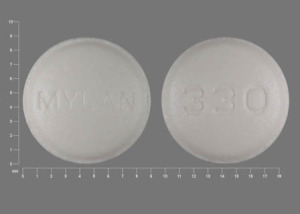Amitriptyline/perphenazine and Alcohol/Food Interactions
There are 6 alcohol/food/lifestyle interactions with amitriptyline / perphenazine.
Amitriptyline Alcohol (Ethanol)
Moderate Drug Interaction
Before taking amitriptyline, tell your doctor if you also use perphenazine. You may need dose adjustments or special tests in order to safely take both medications together. This combination should be used with caution, particularly in the elderly. You should notify your doctor promptly if you have signs of bladder problems, dry mouth, stomach pain, fever, blurred vision, confusion, dizziness, or reduced heart rate. You should avoid driving until you know how these medications will affect you. It is important to tell your doctor about all other medications you use, including vitamins and herbs. Do not stop using your medications without first talking to your doctor.
Amitriptyline Alcohol (Ethanol)
Moderate Drug Interaction
Ask your doctor before using amitriptyline together with ethanol (alcohol), this can alter the effects of amitriptyline and cause increased side effects. Call the doctor if you experience uneven heartbeats, extreme drowsiness, confusion, agitation, vomiting, blurred vision, sweating, muscle stiffness, feeling light-headed, and seizures. You should be warned not to exceed recommended dosages, to avoid alcohol, and to avoid activities requiring mental alertness. If your doctor prescribes these medications together, you may need a dose adjustment to safely take this combination. It is important to tell your doctor about all other medications you use, including vitamins and herbs. Do not stop using any medications without first talking to your doctor.
Perphenazine Alcohol (Ethanol)
Moderate Drug Interaction
Ask your doctor before using perphenazine together with ethanol (alcohol). This can cause uncontrollable movements, agitation, seizures, severe dizziness or fainting, coma, very deep sleep, irregular heartbeats, and high or low body temperature. Use caution when driving, operating machinery, or performing other hazardous activities, these medicaions may cause dizziness or drowsiness. If you experience dizziness or drowsiness, avoid these activities. It is important to tell your doctor about all other medications you use, including vitamins and herbs. Do not stop using any medications without first talking to your doctor.
Amitriptyline Nicotine
Moderate Drug Interaction
Consumer information for this interaction is not currently available.
MONITOR: Smoking cessation may lead to elevated plasma concentrations and enhanced pharmacologic effects of drugs that are substrates of CYP450 1A2 (and possibly CYP450 1A1) and/or certain drugs with a narrow therapeutic index (e.g., flecainide, pentazocine). One proposed mechanism is related to the loss of CYP450 1A2 and 1A1 induction by polycyclic aromatic hydrocarbons in tobacco smoke; when smoking cessation agents are initiated and smoking stops, the metabolism of certain drugs may decrease leading to increased plasma concentrations. The mechanism by which smoking cessation affects narrow therapeutic index drugs that are not known substrates of CYP450 1A2 or 1A1 is unknown. The clinical significance of this interaction is unknown as clinical data are lacking.
MANAGEMENT: Until more information is available, caution is advisable if smoking cessation agents are used concomitantly with drugs that are substrates of CYP450 1A2 or 1A1 and/or those with a narrow therapeutic range. Patients receiving smoking cessation agents may require periodic dose adjustments and closer clinical and laboratory monitoring of medications that are substrates of CYP450 1A2 or 1A1.
Amitriptyline Nicotine
Moderate Drug Interaction
Before taking amitriptyline, tell your doctor if you also use perphenazine. You may need dose adjustments or special tests in order to safely take both medications together. This combination should be used with caution, particularly in the elderly. You should notify your doctor promptly if you have signs of bladder problems, dry mouth, stomach pain, fever, blurred vision, confusion, dizziness, or reduced heart rate. You should avoid driving until you know how these medications will affect you. It is important to tell your doctor about all other medications you use, including vitamins and herbs. Do not stop using your medications without first talking to your doctor.
Switch to professional interaction data
Perphenazine High Blood Pressure (Hypertension)
Major Potential Hazard, Moderate plausibility
phenothiazines - hypotension
Phenothiazines may cause hypotension. Patients with pheochromocytoma, cerebral vascular or renal insufficiency, cardiovascular disease, or a severe cardiac reserve deficiency (e.g., mitral insufficiency) may be more prone to hypotensive reactions. Close monitoring is recommended during treatment if used in at-risk patients; some products may be contraindicated (e.g., thioridazine). Large doses and parenteral administration should be used cautiously, or avoided, in patients with impaired cardiovascular systems.
Switch to professional interaction data
Amitriptyline/perphenazine drug interactions
There are 817 drug interactions with amitriptyline / perphenazine.
Amitriptyline/perphenazine disease interactions
There are 32 disease interactions with amitriptyline / perphenazine which include:
- dementia
- brain damage
- liver damage
- acute alcohol intoxication
- CNS depression
- hematologic toxicity
- hypotension
- liver disease
- anticholinergic effects
- cardiovascular disease
- pheochromocytoma
- acute myocardial infarction recovery
- cardiovascular disease
- seizure disorders
- breast cancer
- NMS
- renal dysfunction
- seizure disorders
- bone marrow suppression
- diabetes
- renal/liver disease
- schizophrenia/bipolar disorder
- tardive dyskinesia
- acute alcohol intoxication
- bipolar disorder screening
- glaucoma
- hyper/hypoglycemia
- liver/renal disease
- neutropenia
- schizophrenia
- thyroid disorders
- urinary retention
More about amitriptyline / perphenazine
- amitriptyline/perphenazine consumer information
- Check interactions
- Compare alternatives
- Pricing & coupons
- Reviews (13)
- Drug images
- Side effects
- Dosage information
- During pregnancy
- Drug class: psychotherapeutic combinations
- En español
Related treatment guides
Drug Interaction Classification
| Highly clinically significant. Avoid combinations; the risk of the interaction outweighs the benefit. | |
| Moderately clinically significant. Usually avoid combinations; use it only under special circumstances. | |
| Minimally clinically significant. Minimize risk; assess risk and consider an alternative drug, take steps to circumvent the interaction risk and/or institute a monitoring plan. | |
| No interaction information available. |
See also:
Further information
Always consult your healthcare provider to ensure the information displayed on this page applies to your personal circumstances.


